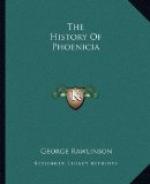Shall fall into the heart of the seas in the day of thy ruin.
At the sound of thy pilot’s cry the suburb’s shall shake;
And all that handle the oar, the mariners, and all the pilots
of the
sea,
They shall come down from their ships, they shall stand upon the
land,
And shall cause their voice to be heard over thee, and shall cry
bitterly,
And shall cast up dust upon their heads, and wallow in the ashes;
And they shall make themselves bald for thee, and gird them with
sackcloth,
And they shall weep for thee in bitterness of soul with bitter
mourning.
And in their wailing they shall take up a lamentation for thee,
And lament over thee saying, Who is there like Tyre,
Like her that is brought to silence in the midst of the sea?
When thy wares went forth out of the seas, thou filledst many
peoples;
Thou didst enrich the kings of the earth with thy merchandise and
thy riches.
In the time that thou was broken by the seas in the depths of the
waters,
Thy merchandise, and all thy company, did fall in the midst of
thee,
And the inhabitants of the isles are astonished at thee,
And their kings are sore afraid, they are troubled in their
countenance,
The merchants that are among the peoples, hiss at thee;
Thou art become a terror; and thou shalt never be any more.”
Translating this glorious burst of poetry into prose, we find the following countries mentioned as carrying on an active trade with the Phoenician metropolis:—Northern Syria, Syria of Damascus, Judah and the land of Israel, Egypt, Arabia, Babylonia, Assyria, Upper Mesopotamia,[924] Armenia,[925] Central Asia Minor, Ionia, Cyprus, Hellas or Greece,[926] and Spain.[927] Northern Syria furnishes the Phoenician merchants with butz, which is translated “fine linen,” but is perhaps rather cotton,[928] the “tree-wool” of Herodotus; it also supplies embroidery, and certain precious stones, which our translators have considered to be coral, emeralds, and rubies. Syria of Damascus gives the “wine of Helbon”—that exquisite liquor which was the only sort that the Persian kings would condescend to drink[929]—and “white wool,” the dainty fleeces of the sheep and lambs that fed on the upland pastures of Hermon and Antilibanus. Judah and the land of Israel supply corn of superior quality, called “corn of Minnith”—corn, i.e. produced in the rich Ammonite country[930]—together with pannag, an unknown substance, and honey, and balm, and oil. Egypt sends fine linen, one of her best known products[931]—sometimes, no doubt, plain, but often embroidered with bright patterns, and employed as such embroidered fabrics were also in Egypt,[932] for the sails of pleasure-boats. Arabia provides her spices, cassia, and calamus (or




